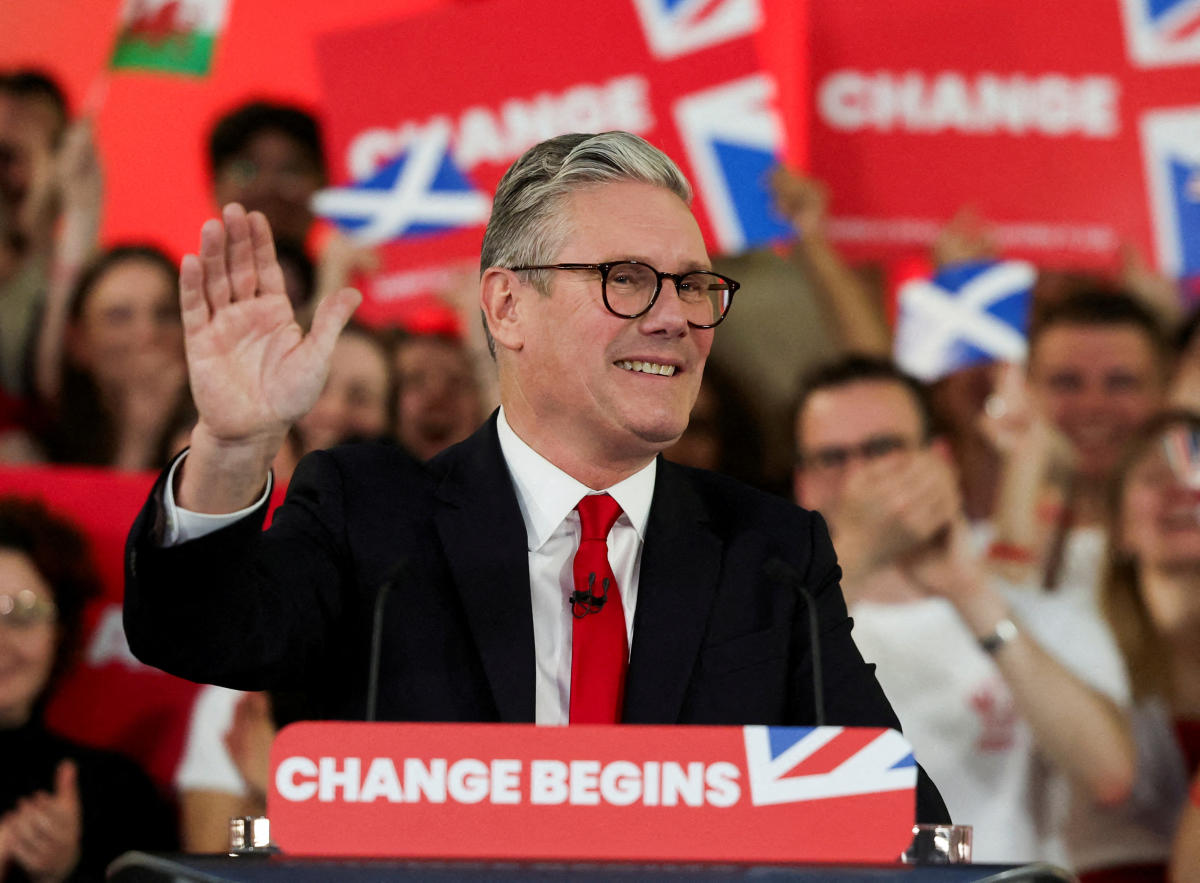The Labour Party won a landslide victory on Thursday night, taking the British Parliament to 412 seats by Friday afternoon.
Eleven members of the outgoing Conservative government lost their seats, in a defeat for Prime Minister Rishi Sunak.
Markets were relatively calm in the aftermath as they expected a Labour victory. We have gathered reactions and expectations from analysts and experts on how the coming weeks and months will unfold.
Markets
The pound and the FTSE 100 (^FTSE) remained calm in London on Friday as polls produced no major surprises.
“There is always a sense of nervousness when markets reopen the day after a general election, but we only see extreme volatility when investors are surprised,” said Dan Coatsworth, investment analyst at AJ Bell.
Read more: Pound rises after Labour’s landslide victory in UK general election
“This time, there was nothing to make heads spin as the outcome was widely expected. Instead, investors seemed to welcome the news with open arms.”
Home builders were among the winners, as they pledged in the manifesto to invest in the construction of new homes.
Barratt Developments (BDEV.L), Taylor Wimpey (TW.L) and Persimmon (PSN.L) were all among the biggest risers in the FTSE 100 index, with all three shares up more than 3% in early trading.
“The relaxed mood in financial markets reflects the fact that Labor’s landslide victory had long been predicted in the polls and was therefore already priced into the market,” said Victoria Scholar, head of investments at Interactive Investor.
“Starmer tried to appeal to the markets during his election campaign by portraying Labour as a pro-business party and by not announcing plans for major tax rises.”
The muted reaction from both indices and the pound contrasts with Liz Truss’ disastrous 2022 mini-budget, which saw the pound collapse and investors rush to sell their London shares.
With the Labour Party remaining relatively stable, the future could look bright for the mid-cap stock market.
“A Labour government could pave the way for better performance from more domestically focused mid-cap stocks if Keir Starmer’s party commits to fiscal stability and boosts confidence in the UK economy,” Scholar said.
Read more: What the new Labour government means for your money
“Theoretically, we could see a snowball effect where the more the UK market rises in response to the election, the more people start to get involved. There’s no guarantee this will happen, but such a reaction would certainly be a long time coming given how unloved UK equities have been since the Brexit vote in 2016,” Coatsworth added.
All eyes on the King’s speech
The next step for Starmer and his team is to make their position known during the King’s Speech from the Throne on 17 July.
“Here, markets get a good idea of Labour’s key policy priorities for its first year in government, including what may play a more prominent role in the Autumn Statement,” said analysts at Deutsche Bank Research.
Analysts say the four most important issues are investment (through the National Wealth Fund), defense, planning reform and trade with Europe, which will make a significant contribution to GDP growth if implemented properly.
Interest rates
With interest rates now in the hands of the Bank of England (BoE), new Chancellor of the Exchequer Rachel Reeves will focus on policies that help keep inflation under control.
The BoE is currently expected to cut the benchmark interest rate by a quarter point in August, as the Monetary Policy Committee meeting in July was postponed due to the election.
““There have been some cautiously positive signs from the UK economic data recently. Real wages are finally starting to improve, inflation has fallen sharply and there are early signs of an earnings recovery,” said Michael Born, investment analyst at Morningstar.
“The UK has its challenges, but if we see continued strong economic performance under this new and largely stable government, and interest rate cuts from the Bank of England, then there is certainly a case to be made that the valuations and yield levels available to UK investors should make the country an attractive prospect for asset allocations.”
Exchange rate
The near future looks bright for the pound, which barely reacted to news of a democratic transition.
“As the result is in line with expectations, we expect the pound to remain broadly unchanged after tonight’s results,” Deutsche Bank said.
“As we noted earlier this week, from a EUR/GBP perspective, attention will quickly shift to (a) the French elections over the weekend (although the risk premium for this event has also fallen significantly) and (b) the next wave of UK data that will determine whether the BoE can cut rates in August.”
Watch: World leaders congratulate ‘friend’ Starmer on election victory
Download the Yahoo Finance app, available for Apple And Android.
